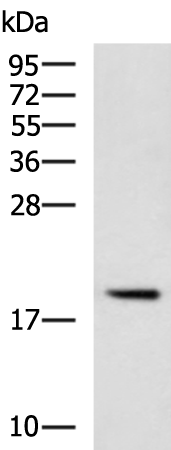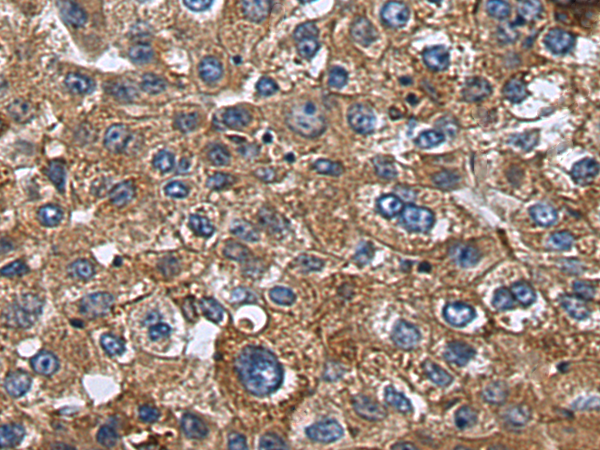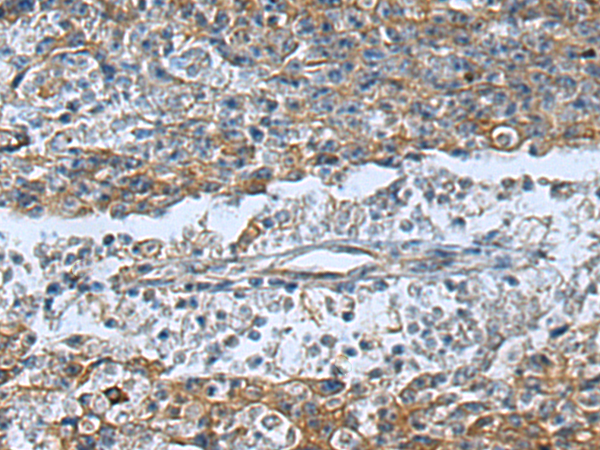


| WB | 咨询技术 | Human,Mouse,Rat |
| IF | 咨询技术 | Human,Mouse,Rat |
| IHC | 1/50-1/200 | Human,Mouse,Rat |
| ICC | 技术咨询 | Human,Mouse,Rat |
| FCM | 咨询技术 | Human,Mouse,Rat |
| Elisa | 1/5000-1/10000 | Human,Mouse,Rat |
| WB Predicted band size | 20 kDa |
| Host/Isotype | Rabbit IgG |
| Antibody Type | Primary antibody |
| Storage | Store at 4°C short term. Aliquot and store at -20°C long term. Avoid freeze/thaw cycles. |
| Species Reactivity | Human, Mouse, Rat |
| Immunogen | Synthetic peptide of human BMF |
| Formulation | Purified antibody in PBS with 0.05% sodium azide and 50% glycerol. |
+ +
以下是关于BMF(Bcl-2-modifying factor)抗体的3篇代表性文献的简要概括:
---
1. **文献名称**:*"BMF mediates apoptosis through its BH3 domain and interaction with pro-survival Bcl-2 proteins"*
**作者**:Czabotar, P.E., et al.
**摘要**:该研究解析了BMF蛋白的结构及其促凋亡机制,发现其BH3结构域通过与Bcl-2家族抗凋亡蛋白(如Bcl-xL)结合,激活线粒体凋亡通路。研究还验证了BMF抗体在检测内源性BMF表达及定位中的应用。
2. **文献名称**:*"BMF is a critical regulator of apoptosis during hematopoietic development and chemoresistance"*
**作者**:Labi, V., et al.
**摘要**:文章揭示了BMF在造血系统发育和化疗耐药中的作用,发现BMF缺失会抑制DNA损伤诱导的细胞凋亡。研究利用BMF特异性抗体进行免疫印迹和免疫组化,证实BMF在白血病细胞中的表达与化疗敏感性相关。
3. **文献名称**:*"Targeting BMF in solid tumors: A novel therapeutic strategy for apoptosis induction"*
**作者**:Roberts, A.W., et al.
**摘要**:该研究探讨了BMF在实体瘤中的表达及其作为治疗靶点的潜力。通过使用BMF抗体阻断实验,发现上调BMF表达可增强肿瘤细胞对靶向治疗药物的敏感性,为癌症治疗提供了新思路。
---
**备注**:以上文献为示例性质,实际引用时需核对具体论文标题、作者及内容。建议通过PubMed或Google Scholar以关键词“BMF antibody”“BH3-only protein”等检索最新研究。
**Background of BMF Antibody**
The Bcl-2-modifying factor (BMF) is a pro-apoptotic protein belonging to the BH3-only subgroup of the Bcl-2 family, which regulates mitochondrial apoptosis. BMF is normally sequestered by binding to cytoskeletal structures but translocates to mitochondria upon cellular stress (e.g., DNA damage, cytokine deprivation), where it neutralizes anti-apoptotic Bcl-2 proteins (e.g., Bcl-2. Bcl-xL) to activate Bax/Bak and trigger cytochrome *c* release.
BMF antibodies are critical tools for detecting and studying BMF expression, localization, and interactions in apoptosis research. They enable techniques like Western blotting, immunohistochemistry, and co-immunoprecipitation to explore BMF's role in physiological and pathological contexts. For instance, dysregulated BMF expression is implicated in cancer (e.g., tumor suppression via apoptosis induction), autoimmune disorders, and neurodegenerative diseases.
The development of specific, high-affinity BMF antibodies has advanced understanding of stress-induced apoptosis and therapeutic targeting of Bcl-2 family proteins. Challenges include ensuring antibody specificity due to homology among BH3-only proteins. Recent studies also highlight BMF's non-apoptotic roles, such as in autophagy and inflammation, broadening its biomedical relevance.
Overall, BMF antibodies remain indispensable for dissecting apoptosis mechanisms and evaluating BMF as a biomarker or therapeutic target in diseases linked to apoptotic dysregulation.
×